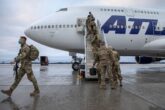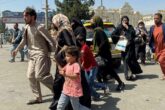August 03, 2022
Sharper: Middle East
Analysis from CNAS experts on the most critical challenges for U.S. foreign policy.
President Biden’s recent Middle East tour was vital in presenting U.S. foreign policy in the region. Other geopolitical developments including the killing of al Qaeda leader Ayman al-Zawahiri, ongoing Iran nuclear negotiations, the state of Afghanistan one year after the United States withdrew troops, and Russia's growing ties to the region have demonstrated that continued U.S. engagement is vital. CNAS experts are sharpening the conversation around America's Middle East policy. Continue reading this edition of Sharper to explore their analysis, commentary, recommendations.
Features
Al Qaeda Leader Ayman al-Zawahiri Killed in Drone Strike
Center for a New American Security experts Richard Fontaine, Paul Scharre, Lisa Curtis, Carrie Cordero, Christopher D. Kolenda, and Jason Dempsey offer insight into the ramifications of the CIA-led killing of al Qaeda leader al-Zawahiri and the lasting legacy of the global war on terror.
Dealing with a Taliban-Controlled Afghanistan
Nearly 20 years after U.S. forces overturned Taliban rule in Afghanistan, the country is likely to reemerge as a terrorist hotbed. While competing with China may be Washington’s current focus, managing evolving terrorism threats and protecting human rights in Afghanistan demands continued U.S. attention and resources. In a CNAS report, Senior Fellow and Indo-Pacific Security Program Director Lisa Curtis provides a detailed roadmap for the U.S. role in Afghanistan moving forward—and how policymakers should support the Afghan people without legitimizing the regime.
Previewing President Biden's Middle East Trip
On the eve of President Biden's departure for his first trip to the Middle East since taking office, CNAS experts Richard Fontaine, Jonathan Lord, Lisa Curtis, and Rachel Ziemba outline expectations, opportunities, and the strategic significance of this visit.
CNAS Responds: Al Qaeda leader Ayman al-Zawahiri killed in drone strike
Center for a New American Security experts offer insight into the ramifications of the CIA-led killing of al Qaeda leader al-Zawahiri and the lasting legacy of the global war ...
Dealing with a Taliban-Controlled Afghanistan
Nearly 20 years after U.S. forces overturned Taliban rule in Afghanistan, the fundamentalist Islamist movement is back in power. This follows the U.S. troop withdrawal in summ...
CNAS Responds: Previewing President Biden's Middle East Trip
On the eve of President Biden's departure for his first trip to the Middle East since taking office, CNAS experts outline expectations, opportunities, and the strategic signif...
Commentaries
Want More Capable Military Partners? Empower and Promote Foreign Area Officers.
"In addition to the SDO-DATTs, the United States Security Coordinator for Israel and the Palestinian Authority (USSC) is slated for demotion as well," warns Jonathan Lord in Breaking Defense. "That job is currently filled by a three-star Army general who has played a crucial role in working with both Ramallah and Jerusalem, following the killing of Palestinian-American journalist Shireen Abu Akleh. The shuttle diplomacy required to tamp down tensions and coordinate security operations between Israel and the Palestinian Authority can only be successfully accomplished by a US military officer with the status and credibility to influence the most senior Israeli and Palestinian security officials. Dropping a field-grade officer into that role like an Army colonel or Navy captain is a recipe for failure, and the President’s recent trip to the region demonstrates that the stakes are just too high."
Establishing a Humanitarian Financial Corridor for Afghanistan
"The humanitarian and economic situation in Afghanistan continues to spiral downward as the harsh winter arrives," writes Alex Zerden in Lawfare. "A humanitarian financial corridor must be established to bring assistance to the Afghan people and stabilize an Afghan economy that is currently in freefall. After the Taliban’s takeover in August, donors suspended billions of dollars in assistance that had propped up 75 percent of the Afghan government’s budget and accounted for 40 percent of annual gross domestic product. The current financial system suffers from acute strains caused by the Taliban’s takeover, such as currency depreciation, rampant inflation, and a shortage of both local currency, the Afghani, and U.S. dollar banknotes upon which the dollarized economy relies. The international community, led by the United States, must take further action to help the Afghan people without rewarding the Taliban."
A New Nuclear Deal With Iran Shouldn’t Be Accompanied By Terrorist Legitimization
"Iran has a new demand for U.S. diplomats as they conclude what will hopefully be the final round of negotiations for a new nuclear agreement later this month: Remove the 2019 U.S. foreign terrorist organization designation on Iran’s Islamic Revolutionary Guard (IRGC). The United States should reject this demand, even if it risks Iranian noncompliance with negotiations. Removing the terrorist stigma from the IRGC will embolden Iranian proxies and anger regional allies," argues John O'Malley in the Global Security Review.
Want more capable military partners? Empower and promote Foreign Area Officers.
When defense ministries in need of reform are left to their own devices, institutional weakness and corruption ultimately produces hollow armies....
Establishing a Humanitarian Financial Corridor for Afghanistan
The international community, led by the United States, must take further action to help the Afghan people without rewarding the Taliban....
A New Nuclear Deal With Iran Shouldn’t Be Accompanied By Terrorist Legitimization
Removing the label of terrorism should take effort on behalf of the offending party, something the Islamic Republic is unwilling to provide....
In the News
Featuring commentary from Richard Fontaine, Lisa Curtis, Elina Ribakova, Samuel Bendett, and Alex Zerden.
A signal of 'impunity'? Biden's trip to Middle East pits human rights against geopolitical reality
During a private conversation at the opulent horse ranch of Saudi Arabia's King Abdullah in 2009, the monarch told President Barack Obama he had his back. Abdullah assured the...
What should the U.S. role in Afghanistan be now?
Center for a New American Security senior fellow and director of the Indo-Pacific Security program Lisa Curtis offers insight on PBS Newshour into the future of Afghanistan an...
Biden to Visit a Saudi Arabia That Is Closer to Russia Than Ever
As President Biden prepares to visit Saudi Arabia, the oil-rich kingdom is closer than ever to Russia and has no plans to disengage from Moscow or help Washington by pumping m...
As Russia Runs Low on Drones, Iran Plans to Step In, U.S. Officials Say
Iran has supplied drone technology to Hezbollah in Lebanon; to Houthi rebels in Yemen attacking Saudi Arabia and the United Arab Emirates; and to Shiite militias in Iraq, whic...
A Would-Be Crypto Baron Plies His Trade in the Taliban’s Shadow
Cryptocurrency booms are often fueled by dreams of life-changing riches. In Afghanistan, buyers are instead snapping up digital coins in hopes of preserving what wealth they h...
Thank you for registering! You will receive a confirmation email shortly. All CNAS events are free, open to the public, and viewable from cnas.org/live.
Stay up-to-date with report releases, events, major updates, and announcements from the Center for a New American Security.
More from CNAS
-
Afghanistan: Why Does Trump Want to Retake Bagram Air Base?
Lisa Curtis, senior fellow and program director at the Center for a New American Security joined Deutsche Welle to discuss President Trump's comments on the U.S. regaining con...
By Lisa Curtis
-
A Failure to Plan: Examining the Biden Administration’s Preparation for the Afghanistan Withdrawal
Afghanistan, Iraq, and Vietnam. One failure is a horrible accident; two failures are a tragic coincidence; three failures are a disturbing trend that shows the U.S. government...
By Christopher D. Kolenda
-
Against All Odds
Eighteen months after taking power, the Taliban is intensifying its repression of Afghan civil society and cracking down on the rights and freedoms of all Afghans, especially ...
By Lisa Curtis, Annie Pforzheimer & Jan Mohammad Jahid
-
To Help Afghanistan, Engage Its Political Opposition
The effort to help Afghans shape a better alternative should begin now....
By Richard Fontaine & Lisa Curtis












